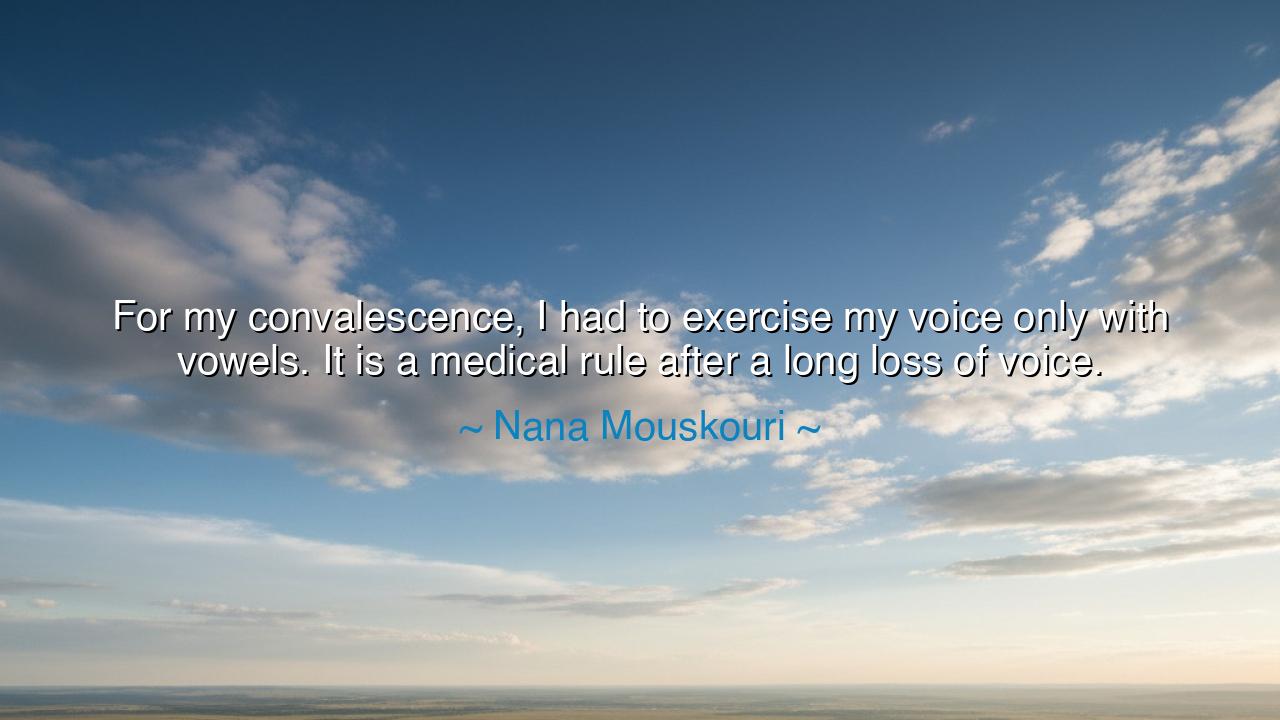
For my convalescence, I had to exercise my voice only with
For my convalescence, I had to exercise my voice only with vowels. It is a medical rule after a long loss of voice.






Hearken to the words of Nana Mouskouri, whose reflection carries both the delicacy of healing and the resilience of the human spirit. She recounts that for her convalescence, she had to exercise her voice only with vowels, observing that it is a medical rule after a long loss of voice. In this simple prescription lies a profound truth: recovery demands patience, discipline, and reverence for the fragile instruments through which we express ourselves. The voice, like the body and soul, must be nurtured with care, slowly awakened from silence into strength.
Since antiquity, the ancients recognized the sanctity of the human voice as an instrument of expression, wisdom, and artistry. Orators of Rome, poets of Greece, and bards of the Celtic lands understood that the tongue and breath are not mere tools, but conduits of thought, emotion, and spirit. Mouskouri’s practice of exercising only vowels mirrors these ancient disciplines: a careful, deliberate cultivation to restore the fullness of expression, honoring both the instrument and the message it conveys.
Consider the tale of Demosthenes, the Athenian orator who overcame a stammer by practicing speech with pebbles in his mouth and reciting verses aloud by the seashore. His methodical exercise of the voice parallels Mouskouri’s own regimen. Through patient repetition and structured discipline, the voice regained its power, transforming limitation into mastery. Herein lies the eternal lesson: recovery and growth often demand focus, humility, and the willingness to work within constraints.
Mouskouri’s words also illuminate the interplay of medicine and art. The vocal cords, delicate yet vital, respond not only to care but to respect. A long loss of voice, whether through illness or strain, requires adherence to method, much as a warrior must gradually rebuild strength after battle. The vowel exercises are not mere mechanics; they are a ritual of restoration, a bridge between fragility and renewed expression.
The story reminds us that setbacks are not endpoints but opportunities for disciplined revival. In every era, whether in medicine, art, or governance, those who endure loss must engage in deliberate practice to regain mastery. Mouskouri’s convalescence becomes a metaphor for all journeys of recovery: approach limitation with patience, follow guidance, and respect the natural rhythm of renewal.
From this reflection, a lesson emerges for all: embrace the necessary disciplines of healing, even when they seem slow or tedious. Trust the rules set by experience and knowledge, for they guide the fragile back to strength. Exercise, repetition, and reverence for the process transform vulnerability into resilience, allowing the body and spirit to emerge wiser and stronger.
Practical guidance flows naturally: those who experience illness, fatigue, or injury should honor structured recovery, respect professional advice, and practice diligently within safe limits. Whether vocal exercises, physical rehabilitation, or mental restoration, the principle remains the same: careful, intentional work restores capability and preserves the integrity of the instrument—be it voice, body, or mind.
Thus, heed the wisdom of Nana Mouskouri: when silenced, act with patience, practice with care, and honor the rules of restoration. In nurturing the voice, we learn a truth that transcends sound: all recovery requires discipline, respect, and attentiveness. Let these lessons guide not only those who sing but all who seek renewal, transforming limitation into opportunity, and silence into harmonious expression.






AAdministratorAdministrator
Welcome, honored guests. Please leave a comment, we will respond soon